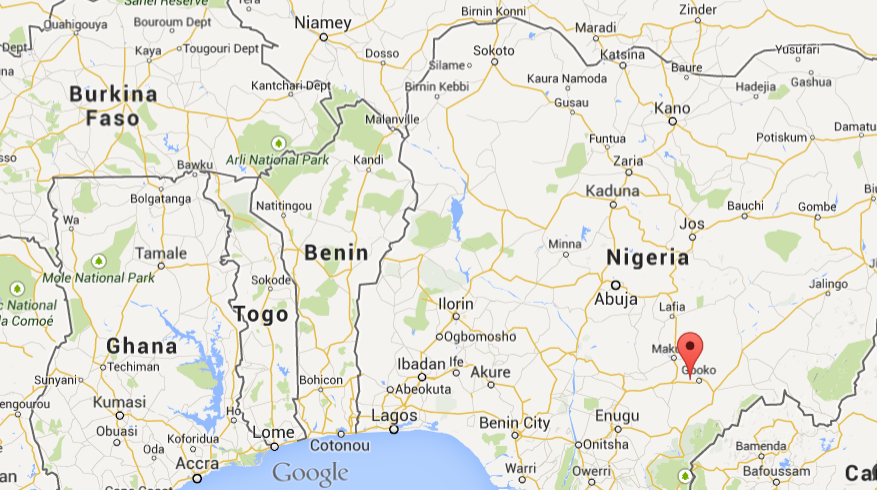Teacher Strike
Posted: April 4th, 2014 | Author: Michael Goldstein | | No Comments »
My colleague Brittney just returned from a trip to Nigeria. There she met an education official who described the teacher strike in her region, called Benue.
It’s gone on since last August!
I went onto the interwebs to learn more. Here’s the story from Yusha’u A Ibrahim:
“I don’t like doing something else, other than learning during school hours but I don’t have a choice since our teachers are still on strike,” these are the words of Ali Bino Ali, a 10-year-old primary 4 pupil in Makurdi, capital of Benue State.
Little Ali, a pupil of Local Government Education Authority (LGEA) Primary School along Hospital Road in Makurdi is one among the many pupils of public primary schools in the state who now find solace in doing menial jobs or hawking for their parents, following the long drawn industrial action embarked upon by the primary school teachers.
Ali, who is presently working as a mechanic apprentice around John Holt junction at the Wadata area of Makurdi, said that his parents decided to engage him in mechanic works to stop him from idling away with some of his mates during school hours.
Daily Trust observed that Ali’s situation is no different from many other childrens in the state, especially those from the less privileged families, who cannot afford to enroll their children into private schools.
Joshua Ameh, a primary three pupil on the other hand, was seen playing football with other children, courtesy of the prolonged teachers’ strike. “This is what we have been doing since the beginning of the strike. My father cannot afford to enroll me into a private school and the strike is still on. Whenever I wake up in the morning, I will go to my friend’s house, pick our ball and start moving to the football field to play,” he said.
When our correspondent visited some primary schools within the state capital, he observed that while domestic animals have turned the classrooms into their relaxation spots youths, on the other hand, are using the premises of such schools for car washing business.
Mr. Terna David, a father of two, whose children attend public school in Makurdi also expressed concern over the strike and pleaded with government to urgently resolve its differences with teachers.
Visibly worried David, who washes car for a living at the premises of Arabic Primary School where his children attend, explained that he has no money to transfer his children to private schools.
“Government should help us end this matter so that our children can go back to school,” he pleaded. Strike by the primary school teachers over the government’s failure to implement the N18, 000 minimum wage has become a recurring decimal in Benue State since 2011. Trouble started when the government excluded the teachers from enjoying the new salary structure in November 2011.
When the teachers protested, government promised to include them in the system by December 2011. At the end of the year, government included only the staff of local government in the system and, by January 2012, the teachers embarked on strike action.
Two months after the commencement of the strike, the national bodies of the Nigeria Labour Congress (NLC) and Nigeria Union of Teachers (NUT) intervened and reconciled the teachers and government, hence, the strike was ended.
Despite this reconciliation, government refused to implement the new salary structure for the teachers, a situation that led to a fresh round of strike which lasted for two months.
Disturbed by the situation, the NUT took over the case on June, 2013 for reconciliation, again. But when the reconciliation move failed, the NUT directed the teachers to go on indefinite strike.
Two weeks after the strike, the state government summoned the executives of the teachers’ union for a meeting where a committee was constituted, under the Deputy Governor, Chief Stephen Lawani, to work out modalities to end the lingering strike.
At the end of its assignment, the committee recommended that the teachers should begin to enjoy the minimum wage by August, 2013. Based on this recommendation, the state government signed an agreement with the NUT in Abuja.
However, the matter took a fresh twist in September 2013 when teachers in the state took to the streets after the government failed to comply with the June’s agreement to implement the new minimum wage in August, 2013.
At this point, Governor Gabriel Suswam stopped payment of the salaries of the teachers and threatened to sack all of them and employ new teachers if they failed to resume work.
While the teachers are bent on continuing with their the prolonged strike to press home their demands for the payment of the N18,000 minimum wage, the government, on its part, resorted to the harsh policy of no-work, no-pay, which has now lasted for three months.
Later, the government changed its decision and increased N1, 000 on each teacher’s salary and pleaded with the union to call off the strike, but the teachers refused and insisted on the implementation of N18, 000 salary structure.
Having realized that the teachers were not ready to resume work despite the increment of N1, 000, the government withdrew its earlier threat to sack all the teachers and directed the payment of the teachers’ October salary to enable them celebrate 2013 Christmas.
Speaking to Daily Trust on the issue, the Chairman, Nigeria Union of Teachers, Benue State chapter, Mr. Godwin Anya, said teachers in Benue State will never resume work until government settled their three months salary arrears and implement the N18, 000 salary scheme for them.
I was curious about the longest teacher strike in USA history. There was one that lasted about this long, in Homer Ohio. Here is the story.
It was a teachers’ strike that stretched from Oct. 16, 1986, to June 23, 1987, setting an undisputed record for the longest teachers’ strike in the state. And experts at such things believe Homer holds the record for the longest one in the nation.
The eight-month-long strike accounted for 156 school days – more than twice as long as the second-longest strike in the nation, which occurred near Cleveland in 2002-03 and lasted 62 days.
The strike effectively wiped out a normal school year for 360 students, led some families to move away or pay tuition for their children to attend neighboring schools and eventually led to a merger with the Allerton-Broadlands-Longview district to the south.
More than half the teachers involved in the strike left, and all but two of the school board members left or were voted off in the first election after the settlement.
And the effect on the town, longtime resident Terry Wolf says, is something akin to a black eye on the face of an otherwise charming small farming community of 1,200.
“It’s not a good memory, and it was a disgrace for the kids,” Wolf said. “I believe the ordeal changed the town permanently.”
….”I think both sides had people with tempers and the tempers just got going,” Propst said. “And then you know, once somebody says something, it escalates. And you get to a point where you almost lose sight of where you started.”
….Reg Weaver, president of the National Education Association in Washington, D.C., was president of the Illinois Education Association during the strike. He made several visits to Homer during the strike.
“I remember the nastiness,” he said. “Even though they started school back the next year, it wasn’t the same. There were a number of excellent teachers who had gone somewhere else to teach. The whole town suffered.”
State Superintendent of Schools Ted Sanders invited both sides to Springfield for a bargaining session. The governor offered the school district more state aid to settle.
In the end, it came down to personalities finally deciding they’d had enough.
I’ve always wondered if, when negotiations break down, resolution could happen faster if a few well-chosen kids were actually allowed to sit there, as the “other party” to the negotiations. Not the parents, the kids.
I think the same of peace treaties, actually. There’s just something about, say, 14-year-olds — the mix of idealism and eye-rolling — that seems like it’d work better than adult mediators to nudge people together.
Send in the kids.



Leave a Reply